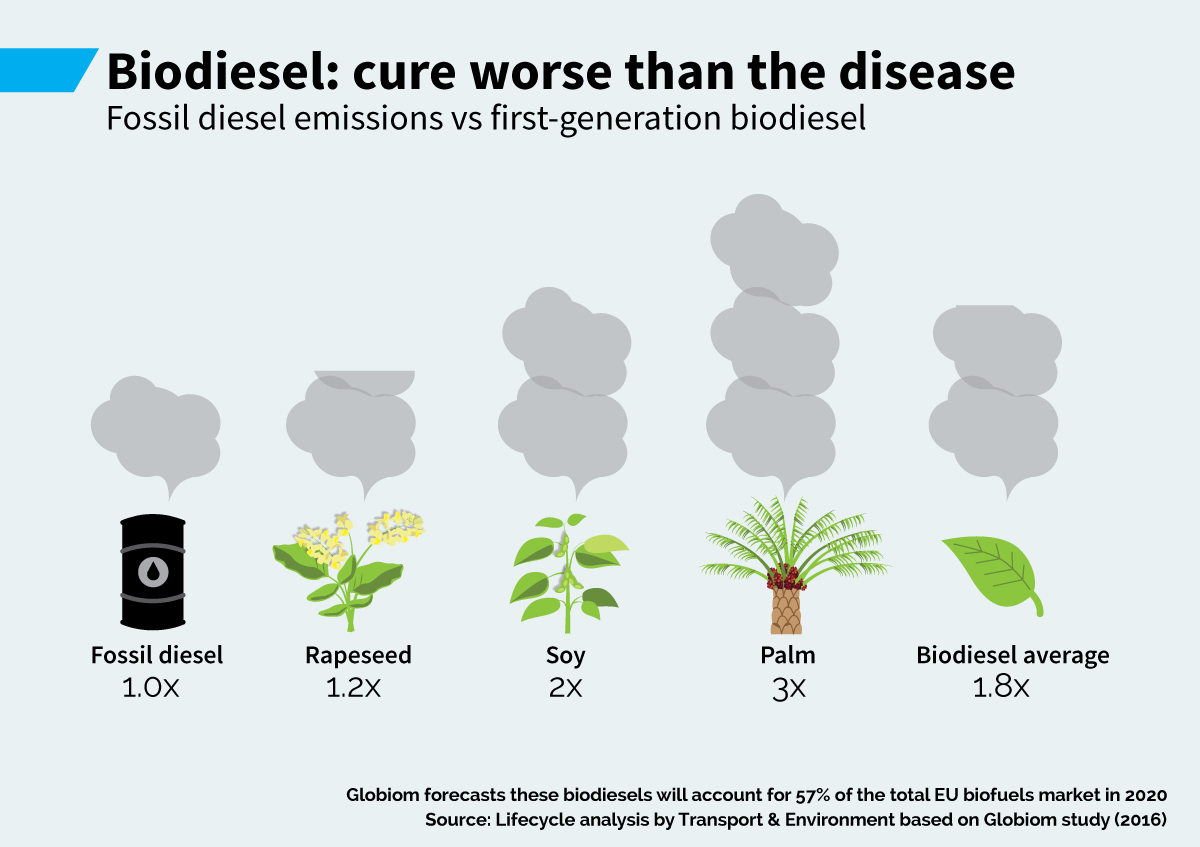
Interested in this kind of news?
Receive them directly in your inbox. Delivered once a week.
On top of this observed direct deforestation, a majority of key regulatory studies modelling emissions from indirect changes in the use of land (ILUC) show that palm oil has generally higher ILUC emissions than any other feedstocks for biodiesel followed by soybean oil (2). The Globiom study for the European Commission, published in 2016, revealed that the climate impact of biodiesel from palm oil is three times that of fossil diesel while soy is two times worse for the climate.
Laura Buffet, clean fuels manager for the European federation of green transport NGOs, Transport & Environment, said: “The scientific evidence is clear: the extra demand for palm oil and soy oil to make biofuels is destroying rainforests, savannahs and draining swamps and peatland. Labelling these biofuels as ‘high ILUC risk’ is in line with science, would halt future deforestation, and reduce carbon emissions associated with it.”
The Renewable Energy Directive published in December last year states high ILUC risk biofuels, such as palm oil and soy biofuels, cannot grow above each country’s 2019 consumption levels and should gradually decrease from 2023 onwards until reaching 0% in 2030. Whilst the principle of phasing out palm and soy biofuels is enshrined in the new law, the Commission has until 1 February 2019 to publish a delegated act establishing the science-based criteria to carry out the commitments made by the EU Parliament and governments.
The Commission is also analysing if and how some types of palm oil and soybean oil could be labelled ‘low ILUC risk’ and be allowed to count towards the climate targets. The study assesses different options and criteria but there are no clear, robust and enforceable options (like yield increases or abandoned land not used for crops) that could guarantee these crops don’t cause more deforestation and displacement of other uses, such as for food.
“Low ILUC risk biofuel is a theoretical concept and implementing it would be like trying to square the circle. There’s no workable, enforceable criteria available that would ensure no indirect deforestation due to additional demand for biofuels. The low ILUC risk option is a wide-open door to let ‘greenwashed’ palm oil back in”, Buffet said.
Europe uses more palm oil to make biodiesel (51%) than to make cookies and cosmetics together. According to a recent Ipsos poll, seven in 10 Europeans are against burning palm oil in their cars. The pan-European NGO campaign #NotInMyTank calls on the Commission to phase out the use of palm oil and soy in biodiesel. So far it has gathered almost 600,000 signatures.
The new EU’s Renewable Energy Directive scraps the target for food-based biofuels after 2020. This means that European countries are no longer forced to subsidise food-based biofuels in order to meet EU’s green energy targets for 2030. EU countries still have the freedom to mandate food-based biofuels after 2020, but the law caps their contribution to the consumption levels achieved in each country in 2020, with a maximum of 7% content in the fuel.


